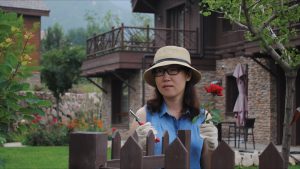“It’s morning again in America.” The ghostly voice of Ronald Reagan blends into the busy milieu of the wood-paneled sales center in Jackson Hole, China – a replica of the Wyoming town built among the mountains north of Beijing. It’s a poignant moment copy and pasted from the late president’s 1984 re-election campaign into Jackson Hole’s sales pitch video, playing on repeat to potential homebuyers.
Indeed, on the first day of my production trip in June 2015, Reagan’s past assertion was a metaphor for the optimism of the town’s leaders and residents, and their attempts to realize the promise of the American dream in China. Through the sales center and tours around the community, young realtors sold a bright future to residents of Beijing eager to escape the restrictions and headaches of the city.
Over the two years I spent living and filming on and off in Jackson Hole, I learned much about what America meant to the Chinese residents there – and about contemporary China too, particularly the desires, aspirations, and troubles of the growing urban middle and upper classes.
Conceived by property developer Liu Xiangshang in 2004, the community was designed and built in collaboration with Oregon-based designer Allison Smith. The town was in keeping with the trend at that time in China for architectural mimicry of North America and Europe. Like many similar foreign-themed developments around the country, Jackson Hole was not only sold as an escape from urban Beijing, but from China itself.
On top of drawing on the desire to leave the city and purchase a detached home with a yard, the developers tapped into the deeper yearnings of Beijing’s elite: for a sense of identity, purpose, and community; the opportunity to display wealth and success; and a chance to pursue dreams without constraint. These yearnings tied in conveniently to the perceived ideology of the American dream and are important aspects of understanding why this town became so appealing to the residents of Beijing.
For “Americaville,” the documentary I ended up making about the community and its accompanying e-book, “Meanings of America for the Residents of Jackson Hole, China,” I decided to focus my energy on following Annie Liu, a new resident who believed moving to the town could deliver happiness. Jackson Hole reminded Annie of the exotic movies about the American West she had grown up watching in China, and also her fond memories of living in small-town Indiana while pursuing a law degree.
It was fascinating to witness what Annie and the community at large imagined America to be. Much of their understanding about the United States was based on mythologies, popular culture from decades ago, and wholesome tradition. Jell-O Salad and Frito Pie, ‘80s country music and early ‘90s Mariah Carey, cowboy hats and endless plaid, John Wayne movies and episodes of “I Love Lucy,” pumpkin carving and trick-or-treat on Halloween, campfires and s’mores in the summer were a sampling of the artifacts from my stay in the town.
The vision of America represented in Jackson Hole, China, captured a version of the U.S. that was diminishing, with its emphasis on mirroring whiteness, the nuclear family unit, defined gender roles, neighborliness, Old West aesthetics, and a myriad of popular culture from America’s past. The image of the United States that the residents of Jackson Hole, China fantasized about was strangely similar to the America that supporters of Donald Trump in the U.S. felt was being lost and needed to be preserved or revitalized.
The image of the prosperous, charming small-town America imagined in Jackson Hole, China has been in decline in much of the U.S. over the past few decades. It’s rare to drive through a rural community in the American heartland and see a place that is truly thriving or in its heyday. Jackson Hole, Wyoming, on the contrary, is a place that has thrived as an enclave for America’s super rich – which perhaps explains why it was chosen as the model to replicate for Beijing’s up-and-comers.
During my time filming in the Chinese replica of Jackson Hole and in the subsequent years since releasing the film, much has changed in China. Xi Jinping’s ascent to power in 2012 marked a significant shift in the country’s direction, particularly with his administration’s attempts to instill a new nationalism within the populace and taking aim at foreign elements, such as “xenocentric” architecture.
In 2015, Jackson Hole was covered negatively in the Chinese state media, with outlets deeming the town as unpatriotic and its residents as traitors for favoring American culture. This rattled the town, prompting the leadership to re-brand their new neighboring development from Coloradan to Swiss, under the rationale that Switzerland was politically neutral, unlike the United States.
After almost two decades of lavish spending, the development company that built and managed the town recently filed for bankruptcy – suffering the same fate as an increasing number of companies in the property sector in China. The wider impression of Jackson Hole in China has proceeded to spiral since the central government’s relations with the United States have soured even further under the Biden administration. The Chinese government has also marched forward with its new nationalism, as a possible distraction from the converging crises of debt, youth unemployment, and the country’s bleak demographic outlook.
I am thankful I recorded “Americaville” when I did. Pursuing this documentary in a post-pandemic China with its new limitations on film production and the caution of places that have caught the ire of the central government, like Jackson Hole, would such a project a near impossible task.
Americaville is now available to watch on Vimeo On Demand.

































